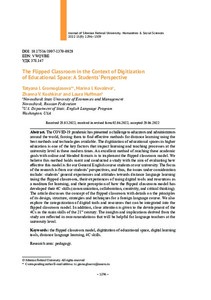The Flipped Classroom in the Context of Digitization of Educational Space: A Students’ Perspective
Скачать файл:
URI (для ссылок/цитирований):
https://elib.sfu-kras.ru/handle/2311/148211Автор:
Gromoglasova, Tatyana I.
Kovaleva, Marina I.
Koshkina, Zhanna V.
Huffman, Laura
Громогласова, Т. И.
Ковалева, М. И.
Кошкина, Ж. В.
Хафман, Лора
Дата:
2022-09Журнал:
Журнал Сибирского федерального университета. Гуманитарные науки. Journal of Siberian Federal University. Humanities & Social Sciences; 2022 15 (9)Аннотация:
The COVID‑19 pandemic has presented a challenge to educators and administrators around the world, forcing them to find effective methods for distance learning using the best methods and technologies available. The digitization of educational spaces in higher education is one of the key factors that impact learning and teaching processes at the university level in these modern times. An excellent method of reaching these academic goals with online and blended formats is to implement the flipped classroom model. We believe this method holds merit and conducted a study with the aim of evaluating how effective this model is for our General English course students at our university. The focus of the research is from our students’ perspectives, and thus, the issues under consideration include: students’ general experiences and attitudes towards distance language learning using the flipped classroom, their experiences of using digital tools and resources as a medium for learning, and their perception of how the flipped classroom model has developed their 4C skills (communication, collaboration, creativity, and critical thinking). The article discusses the concept of the flipped classroom with details on the principles of its design, structure, strategies and techniques for a foreign language course. We also explore the categorization of digital tools and resources that can be integrated into the flipped classroom model. In addition, close attention is given to the development of the 4Cs as the main skills of the 21st century. The insights and implications derived from the study are reflected in recommendations that will be helpful for language teachers at the university level Пандемия COVID‑19 стала вызовом для преподавателей и руководящего
состава университетов по всему миру, поскольку возникла острая потребность
в поиске эффективных методов и технологий для осуществления образовательного
процесса в дистанционном формате. Цифровизация образовательного пространства
вузов выступила ключевым процессом, повлиявшим на учебную деятельность
в этот период. Данная статья посвящена исследованию состоятельности технологии
перевернутого класса для дистанционного изучения дисциплины «Иностранный язык».
Здесь обсуждаются принципы разработки занятий в рамках указанной технологии
и их структура, приводится классификация цифровых образовательных инструментов
и онлайн-ресурсов,
которые могут быть интегрированы в модель перевернутого
класса. Кроме того, особое внимание уделено потенциалу обсуждаемой технологии
для развития таких ключевых навыков XXI века, как 4С (коммуникация, командная
работа, креативность и критическое мышление). Исследование выполнено в рамках
студентоцентрированного подхода: авторы анализируют данные студенческих анкет
об опыте дистанционного изучения иностранного языка с использованием технологии
перевернутого класса, предпочтения студентов относительно цифровых инструментов
и онлайн-ресурсов
как средств обучения, а также восприятие того, насколько модель
перевернутого класса способствует развитию навыков 4С. Полученные результаты
исследования нашли отражение в методических рекомендациях для преподавателей
иностранных языков в вузе
Коллекции:
Метаданные:
Показать полную информациюСвязанные материалы
Показаны похожие ресурсы по названию, автору или тематике.
-
Проекты цифровой философии в контексте развития Digital Humanities
Груздев, А. А.; Самарин, А. С.; Илларионов, Г. А.; Gruzdev, Andrei A.; Samarin, Andrei S.; Illarionov, Grigorii A. (Сибирский федеральный университет. Siberian Federal University, 2023-07)Цель исследования – посредством сравнительного анализа определить основные формы существования цифровой философии как части Digital Humanities. Гипотезой выступает ризоматическая структура цифровой философии, не ... -
Enhancing Digital Skills: The Key to Digital Inclusion for the Older People (on Example of Vietnam)
Tran Thi Bich Ngoc; Dao Thanh Binh; Nguyen Thi Xuan Hoa; Barysheva, Galina A.; Tran Si Lam; Zhironkin, Sergey A.; Чан Нгок Тхи Бик; Дао Бинь Тхань; Нгуэн Тхи Суан Хоа; Барышева, Г. А.; Тран Си Лам; Жиронкин, С. А. (Сибирский федеральный университет. Siberian Federal University, 2023-10)Digital transformation taking place rapidly in all aspects of socioeconomic activities across Vietnam in recent years is affecting the lives of people of all ages. Vietnamese older people, due to the impact of digitization, ... -
Digital Humanities in the Conservation of Cultural Heritage
Lapteva, Marina A.; Gordeeva, Eugenia A.; Laptev, Alexei A.; Лаптева, М.А.; Гордеева, Е.А.; Лаптев, А.А (Сибирский федеральный университет. Siberian Federal University, 2016-07)The use of digital technologies in science has contributed greatly to the creation of new scientific directions and research aspects. The paper discusses tools, aims, methods and administrative instruments used in Digital ... -
The Digital Transactions Currency for the BRICS
Zharikov, Mikhail V.; Жариков, М.В. (Сибирский федеральный университет. Siberian Federal University, 2020-11)The article deals with the circulation of a digital currency as a worldwide problem. The topic has theoretical and practical significance because price stability, economic growth and development and market equilibrium ... -
Classification and Trends in Developing Digital Services In Russian Federation
Yury, Danilchenko; Natalya, Fedorova; Liudmila, Iushkova; Evgenia, Korepanova; Marina, Savelyeva (2019)The article defines a number of indicators for assessing the development of the digital market, and groups the digital services offered to consumers in the Russian Federation. The main trends and directions of development ...

